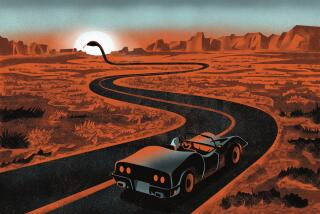Actor’s roles reflected life for blacks in America
- Share via
In the script for the landmark 1964 film “Nothing but a Man,” actor Ivan Dixon saw something familiar in the character Duff Anderson.
Duff was a railroad worker in love with Josie, a schoolteacher and minister’s daughter who lived in an Alabama town. The story of Duff’s attempts to live with dignity and to love, despite racial injustice, was an honest depiction of black life in America, Dixon said. The character, which Dixon later called the most important role he portrayed, resonated in a way that others did not.
“That was me,” Dixon once said of Duff. “I had lived every moment. . . . I was reliving my whole life on film.”
Dixon, who also played Sgt. James Kinchloe on the popular television series “Hogan’s Heroes,” and went on to a long career as a director of episodic television shows and feature films, including “The Spook Who Sat by the Door,” died Sunday at Presbyterian Hospital in Charlotte, N.C. He was 76.
The cause of death was a brain hemorrhage, a complication of kidney disease, said his daughter, Doris Nomathande Dixon.
Longtime friend and colleague Sidney Poitier said Dixon has left his mark on American film, television and theater.
“As a fellow actor, one had to be on one’s toes, otherwise he was quite likely to walk away with the scene,” Poitier said in a statement released to The Times.
“Nothing but a Man,” which also starred jazz singing great Abbey Lincoln as Josie, was written by two white documentary filmmakers who spent time in the South in the 1960s before penning the script. Long after its initial release, Dixon continued to see the movie as an example of film’s potential to more accurately reflect black life. He encouraged the making of more honest films.
“Even among black directors today -- and I’m not saying these guys haven’t done good work -- there is more concern with making movies that make money, that titillate and get people to the box office,” he told Newsday in 1993. “And I think that is the kind of horror of black American life, that we have accepted that struggle for the dollar instead of struggling for humanity. For honor.”
Born in New York on April 6, 1931, Dixon began acting at Lincoln Academy, an African American boarding school in Gaston County, N.C. At North Carolina Central University, he majored in theater and graduated in 1954, the same year he married theater student Berlie Ray. The couple later had four children. In addition to his wife and daughter, Dixon is survived by son Alan Kimara Dixon of Oakland. Two other sons died.
After graduating from college, Dixon continued his studies at Case Western Reserve University and Karamu House in Cleveland, and at American Theatre Wing in New York City. Dixon began his career in theater. He performed in a 1957 production of “The Cave Dwellers,” and played the role of Joseph Asagai, a Nigerian student, in the original 1959 Broadway production of “A Raisin in the Sun” and in the 1961 film version, both of which starred Poitier.
In “The Defiant Ones” and other films, Dixon worked as a stunt double for Poitier but then earned roles in his own right. His other movie credits include the film version of George Gershwin’s opera “Porgy and Bess” in 1959, “A Patch of Blue” in 1965 and the 1976 film “Car Wash.”
In 1960, after Dixon and his family moved to Altadena, he found work in Hollywood, appearing in episodes of numerous television shows, including “The Twilight Zone,” “Perry Mason” and “The Outer Limits.”
“Hogan’s Heroes” ran from 1965 until 1971, but Dixon “didn’t really enjoy being that character,” he said of Kinchloe in a 2000 Daily Variety article. He left after five seasons.
Dixon turned his attention to directing, beginning with an episode of “The Bill Cosby Show” in 1970. In the years that followed, he directed numerous episodes of television shows, including “The Waltons,” “The Rockford Files,” “Magnum, P.I.” and “Snoops.”
In 1973, Dixon directed and produced with Sam Greenlee the controversial feature film “The Spook Who Sat by the Door.” Based on the book by Greenlee, the film tells the story of an African American working for the CIA as a covert operative who takes what he learns to the black community and uses it in a revolt against the government and those in power.
The distributor was so troubled by the content that the movie was pulled from theaters. “I think a lot of people misunderstood ‘Spook,’ ” Dixon had said. “It was a fantasy, and I said everything I ever wanted to say about race in it.”
Aside from his work as a director and actor, Dixon was proud of the many contributions he made to help African Americans advance in acting and production, his daughter said. In the early 1980s at the Directors Guild of America, he helped form a committee to address minority concerns.
Friend and actor Hal Williams said Dixon was “just a champion and a fighter and all in a very, very positive way.” The role Dixon played in confronting disparity and injustice “is almost like a tribute to ‘Nothing but a Man,’ the movie he’s famous for,” Williams said.
--
More to Read
Only good movies
Get the Indie Focus newsletter, Mark Olsen's weekly guide to the world of cinema.
You may occasionally receive promotional content from the Los Angeles Times.










